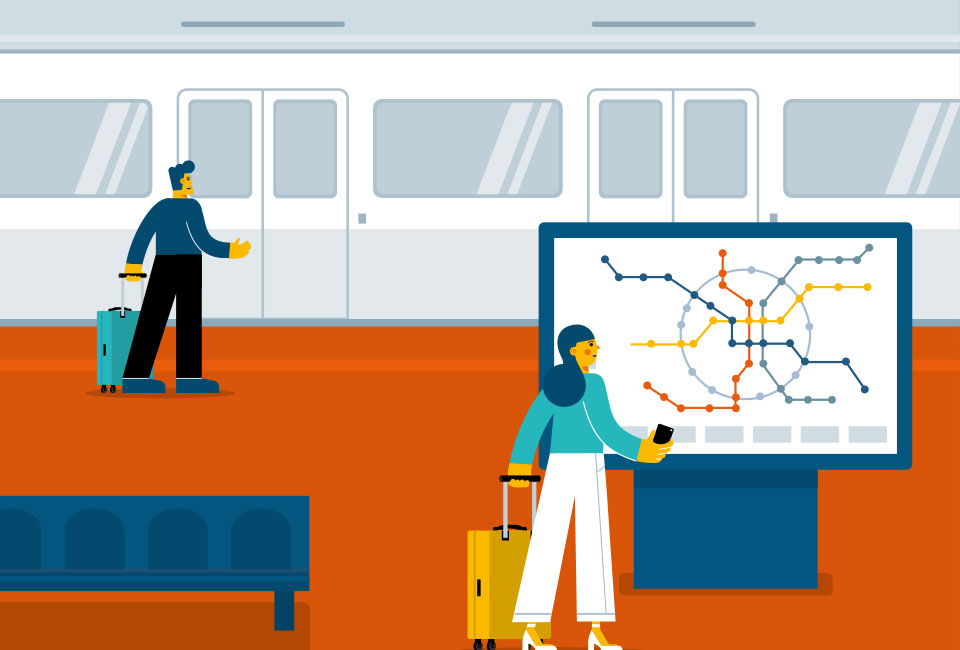
Greenpeace has investigated the price differences between train and airline tickets in 27 European countries. Fliers are cheaper on 79 of the 112 routes, while rail travel is on average twice as expensive as flights. That has to change.
The airline industry is one of the most climate-damaging industries in the world. Nevertheless, greenhouse gas emissions from air traffic in the EU increased by 29 % between 2009 and 2019. From Zurich, for example, up to 100'000 people fly daily during the vacation season. At the same time, according to the 'Interessengemeinschaft öffentlicher Verkehr', Switzerland is threatened with the «biggest deterioration ever» in rail transport.
Flights are in the majority cheaper than the train
Greenpeace investigated the price differences between train and airline tickets in 27 European countries. The prices were queried at nine different times. The prices were taken from the portals of the airlines and the national rail companies. A total of 112 routes were studied. Flights are cheaper than trains on the majority of the routes studied (79 out of 112). Rail travel is on average twice as expensive as flights. Only on 23 of the 112 routes studied is rail (almost) always cheaper than air. In addition, travelers are only comfortable on half of the 23 routes (direct connection, good connections, not slow). Comfortable train routes such as Amsterdam-London, London-Edinburgh and Toulouse-Paris (4 to 4.5 hours each) are also popular for short-haul flights. Flights are much cheaper than trains here.
Barcelona-London is up to 30 times more expensive by train than by plane. This is the highest price difference of the 112 routes studied. The following routes also have high price differences: London-Bratislava (15.5 times more expensive); Madrid-Brussels (15 times more expensive); Budapest-Brussels (12.5 times more expensive); Valencia-Paris (12 times more expensive) and Rome-Vienna (10.2 times more expensive). Rail tickets are most expensive compared to flights in the following countries: United Kingdom (4.04 times more expensive); Spain (3.86 times more expensive) and Belgium (2.6 times more expensive).
People are encouraged to fly
So-called low-cost airlines serve 79 % of all routes studied. EasyJet, Ryanair, Wizz Air, Volotea and other low-cost airlines are almost always cheaper than rail. Their prices are sometimes even lower than the cost of airport and ticket fees. The cheapest ticket found cost 9.99 euros and was sold by Ryanair. «The Greenpeace study shows how people are encouraged to fly. Airlines benefit from outrageous tax advantages», criticizes Herwig Schuster, transport expert of the Greenpeace campaign 'Mobility for All'.
Taking the train in Switzerland is 70 % more expensive than flying
Many of the countries studied are easily accessible by train. Of all the countries studied, Switzerland has the lowest proportion of low-cost airlines. But on average, on all seven routes studied, the train was 70 % more expensive than the flight.
Five direct trains run daily between Zurich and Berlin, including a night train. The fastest train takes 8h 32m. During the day, almost all trains were cheaper than Easyjet and Lufthansa. In 2019, more than 1.1 million passengers were counted on this route. If they had traveled to Berlin by train, that would have saved 97'000 tons of greenhouse gases. That is as much as the annual emissions of 65'000 combustion cars.
Eight high-speed trains run daily between Geneva and Paris. Duration: 3h 13m. Despite Easyjet, the train was usually cheaper. A train ticket cost between just under 30 and just over 90 francs. In 2019, over 1 million people took the plane. They thus caused an additional 57'000 tons of greenhouse gases compared to the train. This corresponds to the annual emissions of 38'000 fossil-fuel-powered cars.
There are six direct trains a day between Zurich and Vienna, including a night train. The day train takes 7h 52m. From Zurich, only the Lufthansa Group flies to Vienna. The train was always cheaper than the plane, on average by over 30 %. 941'000 people took the plane in 2019.
Train and flight need equally long spits
Greenpeace wants a level playing field internationally for trains and flights. VAT on cross-border airline tickets is 0 % in the EU. According to Greenpeace, this contributes to low airfares. An 11 % VAT on international flights would generate 10 billion euros in annual revenue, environmental activists say. And an EU kerosene tax of 0.5 euros per liter would bring in revenue of 46.2 billion euros. «This money could be used for cheaper train tickets», Greenpeace complains, and continues: «Internationally, we demand an end to tax advantages and a stop to subsidies for airlines, as well as a kerosene tax.» The goal: to shift cross-border traffic from air to rail.